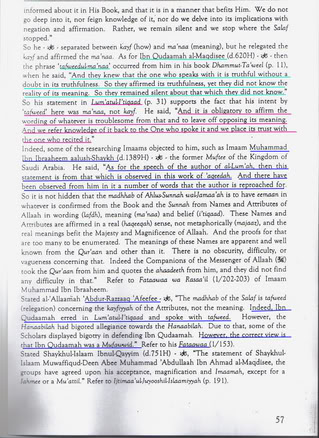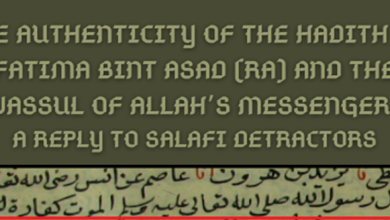Imām ibn Qudāmah The Mufawwiḍ
Imām ibn Qudāmah The Mufawwiḍ
By Usāmah Muttakīn
Introduction
Several quotes from the Imām, Muwaffaq al-Dīn ibn Qudāmah al-Maqdisī al-Ḥanbalī (referred to as Imām ibn Qudāmah henceforth), have been shared for some time, surrounding which there has been some dispute and claims of ambiguity. Two parties have proliferated these statements, each claiming the weight of which, to their own coffers. These two parties comprise of those who, in regards to the attributes of Allāh Ta’ālā, ascribe the way of Tafwīḍ al-Ma’nā (i.e., to consign their meanings to Allāh) to the Salaf, and those who ascribe Ithbāt al-Ma’nā alā’ l-Dhāhir (i.e., affirming the outward meaning) to the Salaf.
In this short write up, I will attempt to bring some quotes from the Imām which I have not witnessed being circulated among the people with the same virulence as others. In doing so I will demonstrate that the position of the Imām in regards to the attributes of Allāh, is infact keeping with the first party i.e., those who ascribe Tafwīḍ al-Ma’nā to the Salaf and thus proving that Imām ibn Qudāmah was a Mufawwiḍ [one who consigns the meanings of the Attributes to Allāh].
The Most Commonly Shared Quotes
I will begin by presenting some of the most common or often labored quotes of the Imām. This will bring the blessed reader’s attention to what the Imām has actually said, as well as where the disputes may occur. Following this, I will present further statements from the Imām, that not only have been missed but also categorically delineate which party he would belong to.
Quote 1:
“And the correct opinion is that the ambiguous [verses] revealed regarding the attributes of Allāh, Glory be to He, are those which it is compulsory to have faith in and impermissible [to occupy oneself] in seeking its interpretation; for example, the statement of Allah, the Exalted, “The Most Merciful above the Throne is established” (Qur’ān, 20:5), “Rather, both His Hands are extended” (Qur’ān, 5:64), “…which I created with my Hands…” (Qur’ān, 38:75), “And there will remain the Face of your Lord” (Qur’ān, 55:27), “Sailing under Our observation” (Qur’ān, 54:14) and similar to them. So, the Salaf (pious predecessors), may Allāh have mercy upon them, have agreed upon their affirmation [ie. belief in them], passing them as they have come and leaving of interpretating them. For indeed Allāh, Glory be to He, has rebuked those who seek their interpretation and included them, in reprimanding, with those who seek strife and He has labelled them the people of aberration.” [Rawḍat al-Nāẓir wa Jannat al-Manāẓir, 1/27]
Quote 2:
“The Madhab of the Salaf, Allāh’s Mercy be upon them, is to have firm belief (Īmān) in the Attributes of Allāh, The Most High, and His Names with which He described Himself in the Qur’ān and His revelation, or upon the tongue of His Prophet, without any additions, any removal from it, not exceeding the bounds of it, without any explanation or interpretation that opposes its apparent, nor making any resemblance with the attributes of the creation or the qualities of contingencies; rather, they passed them on (narrated them) as they came and consigned the knowledge of them to its speaker (Allāh) and the meaning of them to the One that spoke them.”
“And some said it was related from Imām al-Shafi’ī: ‘I believe in what has been transmitted regarding Allāh according to the intent of Allāh, and what has come from the Messenger (Rasūl) of Allāh according to the intent of Rasūl Allāh (peace be upon him).'”
“And they (the Salaf) knew that the One who spoke them (Allāh) was truthful without doubt, so they believed Him. And they did not know the reality of their meanings [i.e. the Attributes], so they were silent about what they did not know. The later and the earlier ones adhered to this. Thus, they strongly advised one another of good obedience and stopping where their formers stopped. And they warned from exceeding their bounds and diverging from their [i.e. the Salaf’s] path. Furthermore, they elucidated their methodology and doctrinal positions. We hope to Allāh that He makes us from the ones who followed them in explaining what they explained and following the path that they traverse.” [Dhamm al-Ta’wīl, 1/11]
Quote 3:
“The Imām Abū Abd’ Allāh Ahmad ibn Muhammad ibn Ḥanbal, may Allāh be pleased with him, said regarding the statements of the Prophet ﷺ: ‘Indeed Allāh descends to the sky of the world’ or, ‘Indeed Allāh will be seen on the Day of Judgement’, and those Ahādīth of this nature, that we believe in them, we affirm them without a modality or meaning. We do not avert anything from them, and we know that what has come from the Prophet is true, we do not confute upon the messenger of Allāh ﷺ and we have not described Allāh with more than what He has described unto Himself, without a limit and without a boundary. ‘There is nothing like unto Him and He is the All-Hearing, All-Seeing.’(Qur’ān, 42:11)” [Lum’at al-I’tiqād, 1/6-7]
The Further Explanatory Statements
From the above statements of the Imām, it has been argued that he intended by his words: “take them as they have come” or “pass them on their Dhāhir,” that they should be taken upon the apparent meaning. This however, will be disproven by turning our attention to his other statements which will now be brought to the noble reader’s attention.
The Imām says:
“And whatever is ambiguous from these [verses referring to the Sifāt of Allāh], it is compulsory to affirm its words, to leave the seeking of its meaning and consign its knowledge to the One [Allāh] who said it.” [Lum’at al-I’tiqād, 1/6]
Here the Imām has very clearly stated that the affirmation of these Attributes of Allāh are upon their words and their meanings are consigned, which gives validity to the fact that wherever he says Dhāhir, his intent is the apparent words and not the apparent meaning.
He says elsewhere:
“If there was an explanation for it (i.e. the texts of the Attributes), it would have been compulsory for the Prophet ﷺ to explain it to his Ummah for indeed, it is not permitted to delay an explanation from its time; and also because if it was compulsory for us to know it’s explanation, then it surely would have been compulsory for the Prophet ﷺ; for verily he is an equivalent for us in the rulings. If it was compulsory upon him, he would not have left any deficiency in it [to withhold the explanation] and because he ﷺ is desirous [of goodness] for his Ummah, he would not conceal from them anything that Allāh had ordered him with. Indeed, Allāh has said: ‘O Messenger, announce that which has been revealed to you from your Lord, and if you do not, then you have not conveyed His message…’ (Qur’ān, 5:67).”
What Imām ibn Qudāmah is saying in essence is that since there is no explanation or direct meaning of the Sifāt from Rasulullah ﷺ, and had there been a meaning known to him, he surely would have informed us of it and since he didn’t, then there’s no need for us to know the meaning either. This is further explained in the next statement:
“There is no need for us to know the meanings of what Allāh Ta’ālā intended from His Attributes Jalla wa ‘Azza, for indeed, He has not intended any action by them and neither has He attached any responsibility regarding them besides believing in them. It is possible to believe in them without knowledge of their meanings and therefore, indeed faith with ignorance [of the meanings] is correct. Verily, Allah has ordered us to have faith in His angels, His books, His messengers and what He had revealed unto them even if we do not know of them except their names.” [Tahrīm al-Naẓr fī Kutub al-Kalām, pg. 51]
In the aforementioned quote, he is clearly saying there’s no need for us to know the meanings intended by Allāh in regards to His attributes as belief in them without meaning is possible just as in other matters. Therefore, it categorically cannot be argued that the Imām meant taking the Attributes on their outward meanings since he dismisses the need for a meaning outright.
While explaining the way of the Salaf, he says:
“It is to have faith in the words, the verses and reports with the meaning that Allāh Ta’ālā has intended (i.e., to say something similar to what has been reported by Imām Shafi’i which has been mentioned above), silence upon what we do not know regarding its meanings, to leave searching for what Allāh has not burdened us with and searching for their explanations as well as what He has not informed us from His Knowledge and to follow the path of those who are steadfast (al-Rāsikhīn) whom Allāh has commended in His clear Book wherein they say: “We believe in all that has come from our Lord.” (Qur’ān, 3:7) [Tahrīm al-Naẓr fī Kutub al-Kalām, pg. 51]
Here the Imām clearly espouses the view of Tafwīḍ al-Ma’nā, stating that the Salaf did not know the meanings of the Attributes, nor did they seek them and thus simply remained silent about them. As for those who object to this, then the Imām has responded to them further along:
“And if one finds fault in silence regarding the explanation, he is erroneous; for indeed, we do not know an explanation for them and the one who does not know anything, it is necessary upon him to remain silent regarding it and it is impermissible for him to speak on it. Allāh Ta’ālā has said: ‘And do not pursue that of which you have no knowledge…’ (Qur’ān, 17:36) and Allāh Ta’ālā has mentioned from among the impermissible things: ‘… and to say about Allāh what you do not know.’ (Qur’ān, 2:169)… and also, if one faults this position, then one faults the Prophet ﷺ; for, indeed, he believed in Allāh and His Words and did not explain anything from them [the ambiguous Attributes] and he did not explain their meanings.” [Tahrīm al-Naẓr fī Kutub al-Kalām, pg. 54]
Admission of the Figureheads from the Opposing View
After presenting the above statements of Imām ibn Qudāmah, the fact of him being a Mufawwiḍ has been explicitly elucidated. If however, any mind is still in doubt then they may see below how some of the figureheads of the proponents of Ithbāt al-Ma’nā ala’l Dhāhir have conceded that Imām ibn Qudāmah was a Mufawwiḍ.
Shaykh Muhammad ibn Sālih al-‘Uthaymīn states in his explanation of the statement in Lum’at al-I’tiqād (first quote in further explanatory quotes mentioned above):
“As for what he mentioned in ‘al-Lum’ah‘, then indeed, he was an adherent upon the methodology of the Mufawwiḍah, it is from the worst of methodologies and the filthiest of them. The author, may Allāh have mercy on him, is an Imām in the Sunnah and he is the furthest of the people from the methodology of the Mufawwiḍah and others beside them from the innovators. And Allāh knows best.” [Ta’liq Mukhtasar ‘alā Kitāb Lum’at al-I’tiqād al-Hādī ilā Sabīl al-Rashād, 1/31]
Although Shaykh Muhammad ibn Sālih al-‘Uthaymīn admits that this is what Imām ibn Qudāmah adhered to, he also attempts to repel the position from him since he considers him an Imām of what he considers to be the Sunnah, the reason for this is explained by another proponent of the view opposing Tafwīḍ al-Ma’nā:
Shaykh ‘Abd al-Razzāq ‘Afīfī said:
“The methodology of the Salaf was consignment regarding the modality (kayfiyyah), not in the meaning (ma’nā), and indeed ibn Qudāmah erred in Lum’at al-I’tiqād as he said with Tafwīḍ; but the Ḥanābila are partisan to the Ḥanābila. Therefore, some Mashā’ikh are extreme when it comes to defending ibn Qudāmah. However, what is correct is that ibn Qudāmah was a Mufawwiḍ.” [Fatāwa wa Rasā’il Samāhat al-Shaykh ‘Abd al-Razzāq ‘Afīfī]
Finally, here is the verdict of the late Shaykh Nāsir al-Dīn al-Albānī from the footnotes of a book attributed to him entitled “Fundamentals of the Salafee Methodology: An Islamic Manual for Reform“. The scan below was provided by our respected Shaykh, Dr. Abul Hasan Hussain Ahmed (hafidhahullāh):






